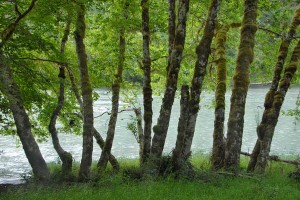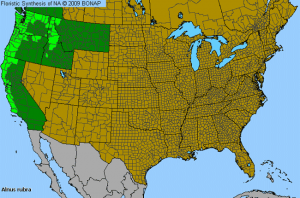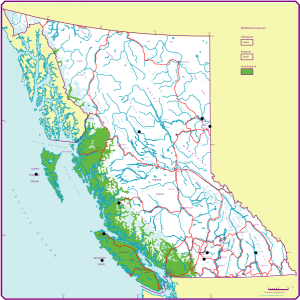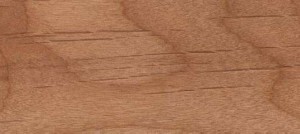A fellow by the name of Larry Workman took this picture. His other fascinating works of the northeast can be found here.
Common trade names: Red alder
Genus: Alnus rubra
Janka Hardness (pounds-force): 590
Description: Red Alder is tan to brown in color, complemented by reddish hues. Red alder tends to continue to darken over time. Looks quite a bit like birch, and there’s a reason: They are both trees of the family Betulaceae. Red alder has tight pores and a generally straight and even grain stock.
Allergic to Red alder? I’d move away from Oregon, if I were you.
Location: Coastal western North America, namely: Alaska, British Columbia, Washington, Oregon, California.
The range of Red alder in British Columbia, courtesy of the Ministry of Forests, Lands, and Natural Resources Operations located therein.
Common Aliases: Alder, Oregon alder, Pacific alder, Western alder
Performance: Red alder is susceptible to moisture penetration, specifically through the endgrains. For this reason, I recommend Red alder only for indoor use. In proper applications, Alder is a good, sustainable performance wood for cabinetry and woodworking. It is a little softer than some of the other American hardwoods, and for this reason is a good wood to work in some specialty interior applications.
Common Uses: Interior furnishings, fine woodworks, turnings, carvings, cabinetry, audio equipment, and any number of applications for a very easily worked (and among the softest) of the hardwoods.
From: The Wood Database
Common Name(s): Red Alder, Western Red Alder
Scientific Name: Alnus rubra
Distribution: Coastal western North America
Tree Size: 100-130 ft (30-40 m) tall, 2-3 ft (.6-1.0 m) trunk diameter
Average Dried Weight: 30 lbs/ft3 (475 kg/m3)
Basic Specific Gravity: .37
Hardness: 590 lbf (2,620 N)
Rupture Strength: 9,800 lbf/in2 (67,590 kPa)
Elastic Strength: 1,380,000 lbf/in2 (9,520 MPa)
Crushing Strength: 5,820 lbf/in2 (40.1 MPa)
Shrinkage: Radial: 4.4%, Tangential: 7.3%, Volumetric: 12.6%, T/R Ratio: 1.7



